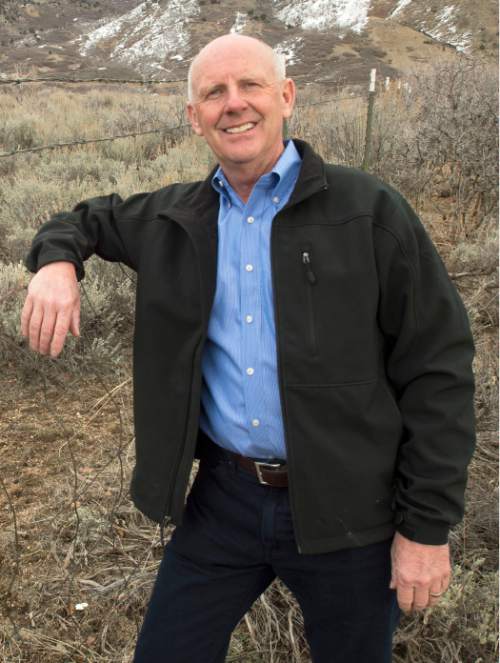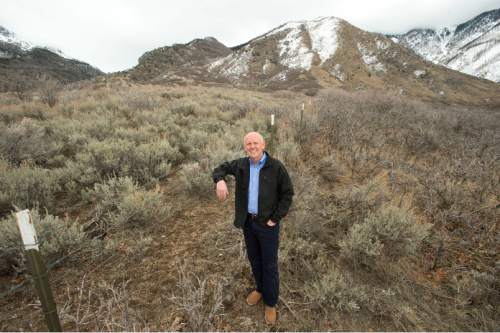This is an archived article that was published on sltrib.com in 2015, and information in the article may be outdated. It is provided only for personal research purposes and may not be reprinted.
The fate of 100 acres of previously untouched land in the Alpine foothills has turned into a battle over property rights, environmental concerns and residents demanding a voice.
The Utah County Commission recently rezoned the land from "critical environment" to include a residential component, and development plans are in the making.
Now, Alpine Mayor Don Watkins and a group of Utah County residents are banding together under the name "We Decide Utah" to try to turn the decision over to a popular vote, something that requires gathering nearly 20,000 signatures on a petition. They point to county commissioners making the zoning change against their own staffs' recommendation and, more importantly, without the consent of residents.
"The question is, are we going to have three commissioners make that decision or are we going to empower ourselves to make that decision?" said Ron Madson, adviser for the newly formed movement. "We want to put it to vote and we'd like [the rezone] to be overturned."
They face a Friday deadline.
The 100 acres on the Alpine mountainside in unincorporated Utah County was previously zoned as critical environment, or CE-1, which would allowed only two houses to be built on the entire parcel.
But the private owner of the land, Phi Properties (formerly Patterson Construction), recently approached the county and asked if the land could be rezoned for residential development. County commissioners accommodated the request, at least in part, designating about 20 acres as a residential zone and putting the rest in another type of critical-environment zone. They restricted the minimum size of the residential lots to one acre.
"It looked like land that could be developed without affecting the sensitive nature of the area around it," County Commission Chairman Larry Ellertson said in an interview.
He said county staff recommended against the rezoning only because the county usually tries to let cities annex and develop nearby land.
Watkins, the Alpine mayor, said the city is more than willing to annex the land and develop it, but only if it stays in CE-1 zoning, with its strict limit on residential development.
Watkins and Ellertson met Jan. 22 but made no progress on a compromise.
"I would like to think we could. But for [the mayor] to say meeting in the middle means that there's no development, well I'm sure that isn't in the middle," said Ellertson.
Unsolved issues • County planners originally recommended against rezoning the property for a variety of reasons, according to their report. Those included a lack of adequate residential services, location within a natural hazards zone, a desire to protect water-recharge areas and minimize human-waste disposal, and the failure to submit a soil report.
Ellertson said he assumes these issues will all be taken care of before the area is cleared for development. He said the staff was never "violently opposed" to the rezoning and the change was eventually endorsed by the planning commission by a 4-2 vote.
Ellertson doesn't agree with petitioners that the decision should be based on a vote of the people. "We have a representative form of government here in the U.S. … Most cases when you are talking about planning and zoning issues, it's not something that I believe is necessary to go to the public for every single decision we make. And I don't think the general public would want that. That would make it so we never get anything done."
Ellertson said the main motive behind the zoning change was to allow the private-property owner to use his land how he wanted. "We do attempt to abide by the principles of private-property rights when we can and when we believe it's something that can be done in an orderly and safe and good manner," he said.
Madson, the We Decide Utah adviser, said that while the Constitution protects property owners from having their land taken away without due process, it doesn't give them the right to do whatever they want with their property — such as develop land that they purchased as a critical-environment zone. "Such an owner has no constitutional right to demand that government take what they purchased and vastly increase its value to the diminution of the surrounding neighbors' environment," he said.
Environmental concerns • Carl Fisher, director of nonprofit Save Our Canyons, listed the dangers of building on a watershed area that normally helps replenish Wasatch Front aquifers. "As you increase development like that up the mountains, you alter the flow of water. You introduce a new and unnatural erosive pattern and run the risk of introducing new toxins into the water supply."
Watkins said the land in question is close to a wildfire scar that occurred just a few years ago. And Utahns saw firsthand the dangers of building on a hillside after the September landslide in North Salt Lake that destroyed one home and forced the temporary evacuation of others.
Ellertson said the 20 acres rezoned for residential development is a flat, grassy field, above landslide danger and away from previous wildfires. He also said the city is still annexing property up the mountainside, so if it is going to develop other sensitive areas, why not this one?
But Watkins said he has been striving to protect the mountainside for years. "I've been very passionate and worked hard to maintain this area to protect this land," he said.
Referendum • The fate of We Decide Utah's referendum effort will soon be known. The group's 45-day deadline to gather nearly 20,000 signatures is Friday.
Utah Valley University student Andrew McGowan, one of the co-directors of We Decide Utah, said the effort has received strong support. He is personally against the development, but said the main issue is giving the people the right to decide.
"By signing the petition, they are really just going to get the right to vote on the issue," McGowan said. "They can vote for the development in that area or they can vote against it, but the biggest thing is that they'll be able to vote on it."





